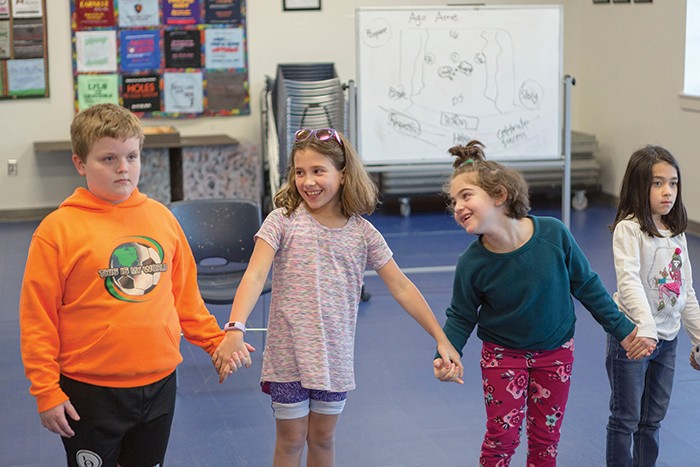For the young students in Renee Wimberley’s beginning theater class, trauma might be the last thing on their minds — if they think about it at all.
The eight children, aged 6 to 8, in the Applause! Youth Theatre class are too busy rehearsing the dinner scene from “Beauty and the Beast” and its showcase musical number, “Be Our Guest.”
But throughout the hour, these youngsters are benefitting from community efforts to combat the effects of traumatic events and chronic stress.
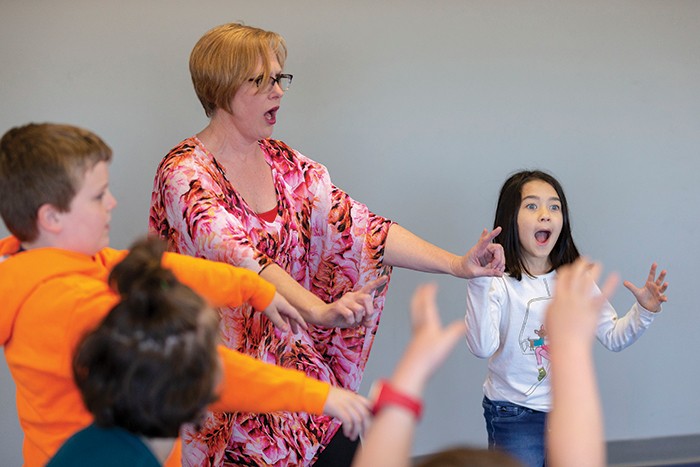
Before rehearsal begins, Renee Wimberley leads the 6- to 8-year-olds in a series of warm-up exercises to calm their jitters, warm up their bodies and help them focus on the hour they will spend together.
As Wimberley invites the students to breathe deeply to settle their jitters and shake their limbs to warm up their muscles, she is teaching them how to calm themselves. As she gently reminds them to “let gravity hold your body down,” Wimberly focuses on the desired outcome instead of calling out disruptive behavior. At the end of the hour, as they practice their choreographed simultaneous bow, the students clasp hands, and there comes the inevitable teasing hard squeeze.
“Ow” someone exclaims.
“No one should be saying ‘ow’!” Wimberley says. “We need to be making sure we’re taking care of each other.”
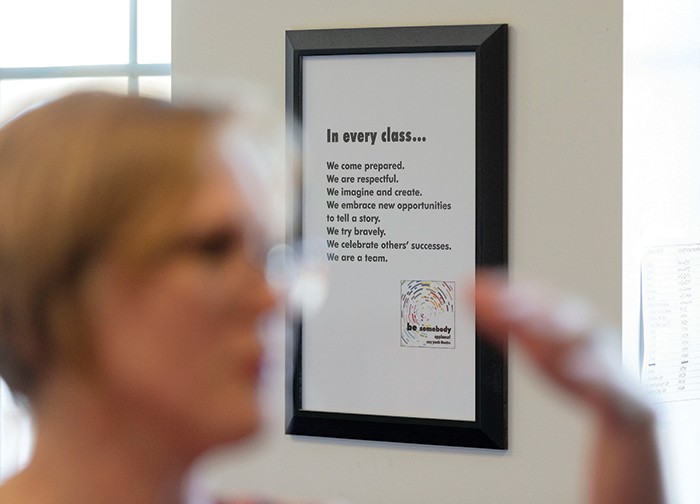
Revised classroom guidelines promote respect and teamwork among students and instructors. “These are not rules; they’re not even expectations,” says Wimberley. “This is just how it is, and we’re going to do that. It definitely gives you a chance to ask questions and build a culture as our kids get bigger.”
The ACEs team
Four Town of Cary staffers have taken this idea of caring for each other to heart and were named Employees of the Year in 2018 for their efforts.
Sam Trogdon, senior operations and program supervisor at Bond Park Community Center, along with Rachel Baranski, performing arts education specialist, and Cary police detectives Armando Bake and Elizabeth Pearson, came together after seeing the documentary “Resilience” in December 2017.
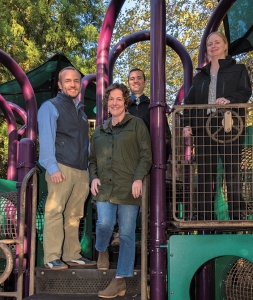
Four Town of Cary employees have spearheaded efforts to reduce the effects of stress and adversity in the community. They are, from left, Sam Trogdon, senior operations supervisor at Bond Park Community Center; Rachel Baranski, performing arts education specialist; and Cary police detectives Armando Bake and Elizabeth Pearson. Photo by Richard Carter/Town of Cary
The movie explores the negative lifetime impact of adverse childhood experiences, or ACEs, and how lives can be transformed by supportive relationships.
ACEs are instances of abuse, neglect or family dysfunction such as divorce or mental illness. A CDC-Kaiser Permanente study in the late ‘90s found that roughly 64 percent of more than 17,000 adult participants reported at least one ACE during their childhood. The study further found that the more ACEs a person experiences, the higher their lifetime risk of substance abuse, depression, obesity, cancer, stroke and heart disease. These diseases were the physical manifestation of chronic anxiety and stress.
“It was eye-opening,” said Bake. The movie “allowed me to see where people were coming from with a different lens. I could see that, potentially, this person is responding this way because they could have these issues — the ACEs — in their life.”
In the last year, “Resilience” has been shown to hundreds of town employees, including police officers and firefighters. First responders, according to experts, can be particularly vulnerable to the negative effects of chronic stress, because they witness trauma regularly in their work. Among other efforts to bolster their resilience, peer support teams were set up for first responders.
It’s helpful for employees to be able to put a name to something they’ve been through, Bake says, and to recognize that they can ask for help.
“All first-responders — whether dispatch, fire, EMS or police — we’re exposed to trauma every day,” Pearson added. “To be able to care for our officers and help them understand that it’s not this taboo thing, and also for them to be able to understand some of the responses they’ll get from people in the community — it’s another tool for them to be able to serve our community.”
Reaching kids, youth
Since April 2017, the nonprofit Advocates for Health in Action has partnered with Wake County and YMCA of the Triangle to build awareness of ACEs and their impact. AHA recently closed, but the nonprofit SafeChild and other community groups continue working to build community resilience.
As a former member of the AHA board, Trogdon was the first of the Cary team to learn about ACEs, and he realized that the Parks and Recreation staff had an opportunity to build supportive relationships with youth and children.
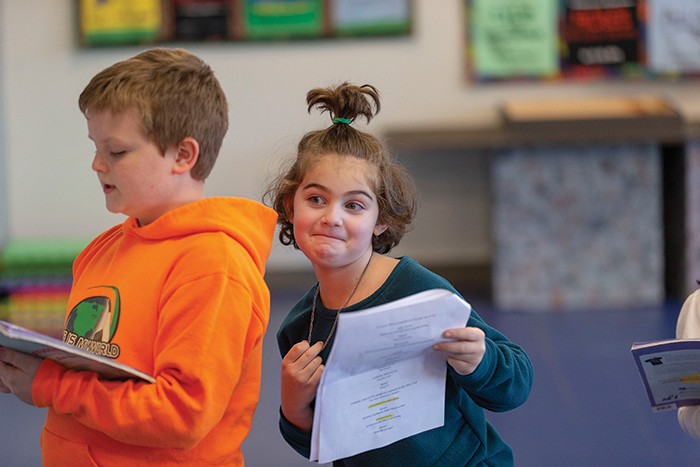
Reed Stallings, who plays the Beast, and Elle Comperatore, who plays Cogsworth, rehearse the dinner scene from “Beauty and the Beast.” Along with lines and choreography, the young actors learn to work together, to be respectful of each other, and to be brave when expressing themselves.
“It’s not necessarily what’s wrong with you. It’s what’s happened to you, and applying that as we work with kids, work with youth, work with families,” he said.
In May, Trogdon showed “Resilience” to nearly 70 summer camp counselors and seasonal staff and trained them on resilience-building techniques. At the end of the summer, he asked how the film and the training affected their experience.
“It shifted their perspective,” he said. “You’re seeing the kids differently and having more patience for them. That’s ultimately what we want.”
Parks and Rec staff also changed how they handled discipline issues at the summer programs.
“When a kid does something bad or wrong, people may decide to suspend the kid or remove them from the kids who are behaving and obeying,” he said. “Having that shift of perspective, this could be the best place for them – in a structured environment.”
Everyone benefits
Baranski and her team at Applause! revised their discipline policy as well. This used to include prescribed steps: a verbal warning, a write-up, then some sort of action taken against the student.
“We don’t even call it a discipline policy anymore. We call it a behavior management strategy,” said Baranski. “Instead of that write-up stage, it’s reframed into a reconnection stage, where the instructor is getting down on the child’s level to say, ‘What’s going on? Is there a way we can help you be more successful at this?’”
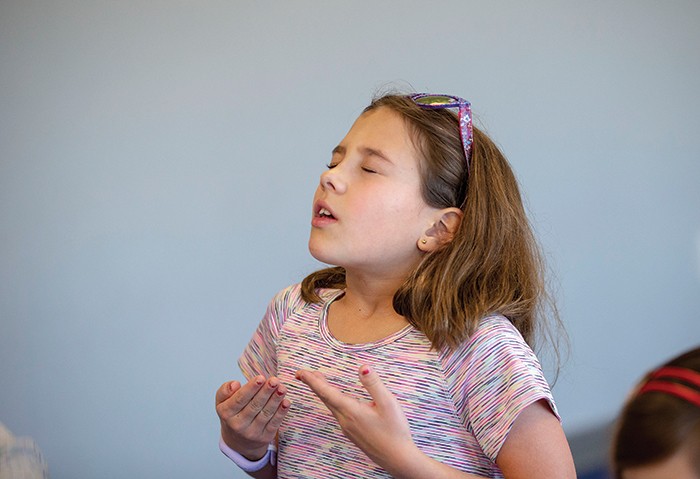
Gianna Marsini takes a deep breath before class begins. This “belly breathing” is a lifelong skill to help the students relax when they are in stressful situations.
Applause! instructor Samantha Matthews says the trauma-informed training has enabled her to find more patience when dealing with negative behavior.
“I’ve often been surprised by the way students will open up once they realize I’m not just punishing a behavior, but that I care enough to find out what’s going on with them,” she said. “This has brought me insight to my students lives, but also has surprised me that the students in which you assume everything is ‘okay,’ and they’re just ‘acting out’ are often the kids who are in the most need for combating ACEs scores.”
As a way to quantify the effects of the behavior strategy, Baranski plans to track the number of disciplinary meetings with parents. At a broader level, she says the resilience goals have already helped the entire Applause! team work better together.
“I see it in the classroom and among my instructors as well. If somebody’s got some stuff going on at home, the other instructors are quick to step up,” Baranski said. “That’s been amazing to see.”
Real results
Resilience-focused guidelines are posted prominently on the wall of every Applause! classroom. Instead of rules against talking, touching and running, the expectations set the stage for caring interactions.
We are respectful. We try bravely. We celebrate others’ successes. We are a team.
SafeChild and the ACEs Resilience Project in Wake County, safechildnc.org/resilience-project
“Resilience: The Biology of Stress and the Science of Hope” documentary, kpjrfilms.co/resilience
Marbles hosts free screenings of “Resilience” once a month, imaxraleigh.org/events
Cary Parks, Recreation & Enjoyment, townofcary.org/recreation-enjoyment
Find your ACE Score, acestoohigh.com/got-your-ace-score
Wimberley, who teaches classes throughout the Triangle, says following the guidelines enables her and her students to build a culture of respect and inclusion. By encouraging caring behavior and empathy, these principles can have profound and sometimes heartbreaking results.
She describes an Applause! musical theater camp she taught last summer that included middle- and high-school actors of all abilities performing improv, acting, singing and dancing. Everyone — even an actor’s service dog — was part of the show.
“It was great to watch the children love, love, love each other so beautifully,” Wimberley said.
As the camp ended, she explains, a sixth-grade student stood to say goodbye. He hadn’t wanted to go to the theater camp, he said, but since he was staying with his grandmother, she made him go. Wimberley says she fought back tears as he continued.
“You guys don’t know that I get beat up all the time. I have no friends at my school back home, and nobody has ever loved me in a group like you guys have. You just assumed that I belonged here.”
- I’ll Have the Combo!
- Yoga for Everyone
- Making friends after 55
- Nonprofit Spotlight: Wheels 4 Hope
- Building a Resilient Cary
- Small Business Spotlight: Excel Body Fitness
- A New Kind of Brew
- Seven Saturdays from R&D Brewing
- Flying Pepper Tobago Infused Vodka
- Sing a Song of Solomon’s Seals
- From the Editor: April 2019




